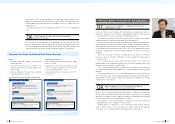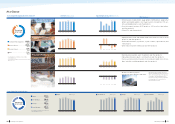Epson 2008 Annual Report Download - page 16
Download and view the complete annual report
Please find page 16 of the 2008 Epson annual report below. You can navigate through the pages in the report by either clicking on the pages listed below, or by using the keyword search tool below to find specific information within the annual report.
28 Seiko Epson Corporation
29Annual Report 2008
5. Audit system
Based on corporate regulations governing auditors and
audit procedures, statutory auditors have the authority to
conduct hearings with directors and other key personnel
whenever they deem such hearings necessary.
Statutory auditors are also authorized to attend
sessions of the Corporate Strategy Council, the
corporate management meeting and other important
business meetings. Attendance at these meetings
enables the auditors to conduct audits based on the
same information as directors. Statutory auditors also
routinely review important documents related to
management decision making.
Epson has established an Audit Staff Office with
specialized personnel to assist the statutory auditors in their
duties. The views of the board of statutory auditors are
given a great deal of weight in the evaluation and transfer of
personnel assigned to this office.
To improve the effectiveness of their audits, statutory
auditors consult on a regular basis with the internal Audit
Office and independent public accountants.
In addition, the holding of regularly scheduled meetings
with representative directors allows statutory auditors to
directly assess business operations.
4. Risk management
Epson has established regulations that form the basis of
its risk management system and has defined the
organization, procedures, and other key elements of this
system.
Overall responsibility for risk management resides
with the president, with heads of each business and
department responsible for the management of risk in
their respective consolidated businesses.
Under the presidents leadership, a forum has been
established wherein risk management–related issues are
discussed. This forum routinely deliberates to identify
and assess important Group risks and implements
activities appropriate for their control. When major risks
become apparent, the president leads the entire company
in mounting a swift initial response in line with Epsons
prescribed crisis management program.
The president periodically reports to the board of
directors on risk management issues and formulates
appropriate measures to respond to these risks.
2. Safeguarding and management of
work-related information
The safeguarding and management of information related
to business operations is carried out under regulations
governing document management, management
approvals and contracts, and other related regulations,
with directors and statutory auditors reviewing these and
other relevant documents on an ongoing basis.
3. Compliance-based management
Epson has established regulations on management
compliance that set forth the basis for its legal compliance
and has set up a compliance system. As a cornerstone in
the practice of trust-based management, Epson has
established principles of corporate conduct and an
employee code of conduct that is based upon these
principles.
In addition, the president holds overall responsibility
for managements legal compliance, with heads of each
business and individual department responsible for
compliance with laws related to their respective
consolidated businesses.
Epson has installed a legal compliance hotline and
other counseling services to facilitate internal compliance-
related inquiries and reporting and is implementing in-
house compliance training, including web-based training,
for employees.
A forum has been instituted in which issues related to
managements legal compliance are discussed under
the presidents leadership. Standing statutory auditors
also attend this forum, which allows them to corroborate
the actual content of legal compliance programs.
The president periodically reports to the board of
directors on compliance-related issues and formulates
appropriate measures as needed.
Internal Control System
Improvements
Epson has established the following basic policies for
improving its system (hereinafter, internal control) for
ensuring the appropriate conduct of operations. Under
these basic policies, responsible departments promote
improvements. These improvements, which are based
on the Management Philosophy and Principles of
Corporate Conduct that embody the philosophy, are
reported to the Trust-Based Management Promotion
Meeting, which is attended by all directors and standing
statutory auditors. By doing this, Epson is taking action
to steadily improve the level of internal control for the
entire Group.
1. Business execution system
Epson is instituting a system that will ensure the efficient
execution of business. To that end, Epson has
established regulations governing each job function, the
division of operational duties, and the management of
affiliated companies while distributing power and
authority across the entire Group. Affiliated companies
in particular must report or receive prior approval from
the parent company of changes in management
regulations. Regulations at affiliates that meet certain
criteria are put on the agenda for discussion at the
parent companys board meetings, thereby creating a
system of business oversight for the Group.
Personnel responsible for business operations must
report to the board of directors on the following items at
least once every three months.
• Current business performance and
performance outlook
• Risk management responses
• Status of key business operations
Epsons Compliance-Based Management System
Various Counseling Services
• Legal compliance hotline (Audit Office)
• Counseling for victims of sexual harassment and power abuse
(Human Resources Department, etc.)
• Counseling related to overwork and long working hours
(Human Resources Department)
• Career counseling (Human Resources Department)
• Psychological counseling (General Affairs Department)
• Labor union counseling (Labor Union)
Trust-Based Management Promotion Meeting
Position: Presidents Advisory Panel
Members: President, directors, statutory auditors,
Audit Office general manager, etc.
Matters
discussed: 1. All issues related to trust-based management
2. Compliance-based management
3. Risk management
4. Environmental strategy, etc.
Risk Management System
Risk Management Regulations
• Overall responsibility: President
• Implementation responsibility: Divisional and departmental heads
• Identify in advance risks in business areas and operational fields and
take action to respond to them
Crisis Management Committee Regulations
• Overall responsibility: President
• Mobilization of comprehensive command structure
when major risks become apparent
• Initially define the seven different kinds of crisis by type
(crisis management program)
1. Leakage of sensitive information (including personal information)
2. Damage from natural disasters
3. Country risk
4. Criminal acts against the Company
5. Computer system crashes
6. Product liability/quality problems
7. Environmental accidents at plants
Trust-Based Management Promotion Meeting Board of Directors
Routine Discussion/Reporting
Response to Crisis
Year ended March 31, 2008
Clearing up after heavy snow at
Epson Toyocom Corporations Wuxi Plant in
January 2008
Crisis Management
Program
























